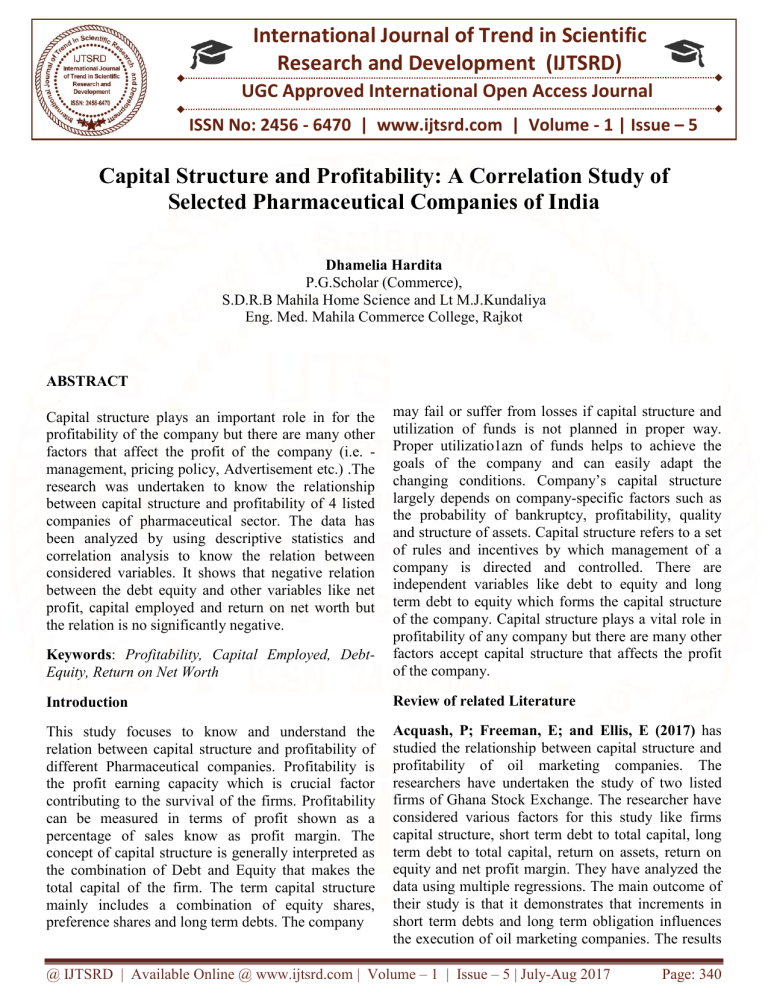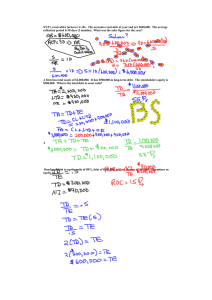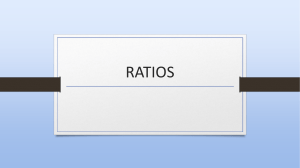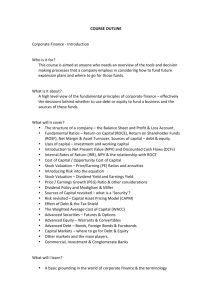
International Journal of Trend in Scientific
Research and Development (IJTSRD)
UGC Approved International Open Access Journal
ISSN No: 2456 - 6470 | www.ijtsrd.com | Volume - 1 | Issue – 5
Capital Structure and Profitability: A Correlation Study of
Selected Pharmaceutical Companies of India
Dhamelia Hardita
P.G.Scholar (Commerce),
S.D.R.B Mahila Home Science and Lt M.J.Kundaliya
Eng. Med. Mahila Commerce College, Rajkot
ABSTRACT
Keywords: Profitability, Capital Employed, DebtEquity, Return on Net Worth
may fail or suffer from losses if capital structure and
utilization of funds is not planned in proper way.
Proper utilizatio1azn of funds helps to achieve the
goals of the company and can easily adapt the
changing conditions. Company’s capital structure
largely depends on company-specific factors such as
the probability of bankruptcy, profitability, quality
and structure of assets. Capital structure refers to a set
of rules and incentives by which management of a
company is directed and controlled. There are
independent variables like debt to equity and long
term debt to equity which forms the capital structure
of the company. Capital structure plays a vital role in
profitability of any company but there are many other
factors accept capital structure that affects the profit
of the company.
Introduction
Review of related Literature
This study focuses to know and understand the
relation between capital structure and profitability of
different Pharmaceutical companies. Profitability is
the profit earning capacity which is crucial factor
contributing to the survival of the firms. Profitability
can be measured in terms of profit shown as a
percentage of sales know as profit margin. The
concept of capital structure is generally interpreted as
the combination of Debt and Equity that makes the
total capital of the firm. The term capital structure
mainly includes a combination of equity shares,
preference shares and long term debts. The company
Acquash, P; Freeman, E; and Ellis, E (2017) has
studied the relationship between capital structure and
profitability of oil marketing companies. The
researchers have undertaken the study of two listed
firms of Ghana Stock Exchange. The researcher have
considered various factors for this study like firms
capital structure, short term debt to total capital, long
term debt to total capital, return on assets, return on
equity and net profit margin. They have analyzed the
data using multiple regressions. The main outcome of
their study is that it demonstrates that increments in
short term debts and long term obligation influences
the execution of oil marketing companies. The results
Capital structure plays an important role in for the
profitability of the company but there are many other
factors that affect the profit of the company (i.e. management, pricing policy, Advertisement etc.) .The
research was undertaken to know the relationship
between capital structure and profitability of 4 listed
companies of pharmaceutical sector. The data has
been analyzed by using descriptive statistics and
correlation analysis to know the relation between
considered variables. It shows that negative relation
between the debt equity and other variables like net
profit, capital employed and return on net worth but
the relation is no significantly negative.
@ IJTSRD | Available Online @ www.ijtsrd.com | Volume – 1 | Issue – 5 | July-Aug 2017
Page: 340
International Journal of Trend in Scientific Research and Development (IJTSRD) ISSN: 2456-6470
of analysis shows that short term debt to total capital,
long term debt capital and total debt to total capital
are independent variables in comparison with return
on assets, return on equity and net profit margin as
dependent variables concludes that capital structure
using leverage ratio have negative effect on
profitability as measured on return on assets, return on
equity and net profit margin of oil marketing
companies.
Khalid, A; Khursheed, A and Mouh-i-Din, S (2013)
have studied the impact of capital structure on
profitability of listed companies. They have taken into
consideration the data of Automobile Industry. The
main objective of researchers was to know the
relationship between the capital structure and
profitability of the firms. They have considered many
different ratios in their study and have found
correlation matrix for capital structure and
profitability of the firms. They have included different
ratios like Debt to Equity, debt to assets, gross profit
ratio, net profit ratio, operating profit, return on
capital employed. They found in their study that debt
to equity ratio in negatively correlated to profitability
ratio. Debt to assets ratio and interest coverage ratio
and positively and significantly correlated with the
profitability ratio. Thus capital structure does have
statistically significant impact on profitability of
firms.
Velnampy, T and Niresh, J (2012) have studied the
relationship
between
capital
Structure
and
profitability. They have studied the variables of 10
listed Srilankan banks. The researchers have
considered various ratios to know relation between
capital structure and profitability. It includes Debt to
equity, debt to total funds, net profit ratio, return on
capital employed, return on equity and net interest
margin. In this research the researcher found that
there is negative relation between capital structure and
profitability except the reltaion between debt to equity
and return on equity.
Objectives of Research
Following are the objectives of present research
paper:
1) To understand the capital structure of the
Pharmaceutical Companies.
2) To know the relationship between capital structure
and profitability of the company.
Hypothesis of the study
The following Hypothesis were formulated for the
study
➢ H0 –There is a negative relationship between
Debt to Equity and Net Profit.
➢ H0–There is a negative relationship between
Debt to Equity and Return on Capital
Employed
➢ H0–There is a negative relationship between
Debt to Equity and Return on Net Worth /
Equity
➢ H0–There is a t negative relationship between
Debt to Total Funds and Net Profit.
➢ H0–There is a negative relationship between
Debt to Total Funds and return on Capital
Employed.
➢ H0–There is a negative relationship between
Debt to Total Funds and Return on Net Worth
/ Equity
Research Methodology
In order to carry out the research work properly and
systematically, it is necessary to prepare a research
methodology first. In the present research paper,
following research methodology is used.
Title of the study
Title of study is as under:
“Capital Structure and Profitability: A Correlation
Study of Selected Pharmaceutical companies of
India”
Sample size
The study is undertaken by considering the data of
different companies associated with Pharmaceutical
sector. The researcher has taken into consideration 4
different companies associated with pharmaceutical
sector. The study includes Torrent Pharmaceuticals,
Cadila Healthcare, Ajanta Pharma and IPCA
Laboratories.
@ IJTSRD | Available Online @ www.ijtsrd.com | Volume – 1 | Issue – 5 | July-Aug 2017
Page: 341
International Journal of Trend in Scientific Research and Development (IJTSRD) ISSN: 2456-6470
Sample Profile
TORRENT
CADILA
AJANTA
Ipca
BSE: 500420
NSE:
TORNTPHARM
ISIN:
INE685A01028
SECTOR:
Pharmaceuticals
BSE: 532321
NSE:
CADILAHC
ISIN:
INE010B01027
SECTOR:
Pharmaceuticals
BSE: 532331
NSE:
AJANTPHARM
ISIN:
INE031B01049
SECTOR:
Pharmaceuticals
BSE: 524494
NSE:
IPCALAB
ISIN:
INE571A01020
SECTOR:
Pharmaceuticals
Founded On 1959
1952
Headquarters Ahmedabad, India Ahmedabad, India
1973
Mumbai, India
1949
Mumbai, India
Main
Members
Sudhir
Mehta, Ramanbhai Patel
Samir Mehta
Yogesh Agrawal, K.B.
Mehla
Rajesh Agrawal
Dr. N.S. Tibrawala
Revenue
Employees
working
INR 66 billion
8600
INR 17.05 Billion
6,500+
Listed As
INR 54.7 Billion
13180
INR 15.59 Billion
12000
Method of Data Collection
The researcher has used secondary data for the
analysis. The details of different ratios are taken
fromwww.moneycontrol.com dated on 1st July 2017.
The details have been collected from the financial
statement and ratios given by the company. The
researcher has considered the data of last 4 years for
the study.
Tools and Techniques
The researcher has used Descriptive Statistics as well
as inferential test to analyse the data to know the
relationship between profitability and capital structure
of the company. Descriptive Statistics analysis helps
to know the mean and standard deviation. Inferential
test statistics helps to draw conclusions from the data
and helps to test the hypothesis considered by the
researcher. It includes the Correlation Analysis.
Limitation of Present Research
1) The method of data collection is secondary so the
data which is available is not reliable.
2) The data has been collected for 4 years only so the
result is not applicable for coming years.
3) The outcomes are only available for the above
companies and not the other companies
@ IJTSRD | Available Online @ www.ijtsrd.com | Volume – 1 | Issue – 5 | July-Aug 2017
Page: 342
International Journal of Trend in Scientific Research and Development (IJTSRD) ISSN: 2456-6470
Analysis and Interpretation
Table - 1
A Table Showing Descriptive Statistics
N
Minimum
Maximum
Mean
COMPANY
16
1
4
2.50
Std.
Deviation
1.155
NET PROFIT RATIO
16
3.24
32.48
18.7694
7.73581
RETURN ON CAPITAL EMPLOYED
16
4.76
48.90
26.5356
11.10900
RETURN ON NETWORTH
DEBT/ EQUITY RATIO
16
16
3.96
.05
47.83
.84
27.8444
.3350
11.26566
.19456
LONG TERM DEBT/ EQUITY
16
.01
.81
.2363
.19363
Valid N (list wise)
16
Descriptive statistics (Table 1) shows that no of companies and different ratios considered by the researcher in
their studies. It shows the minimum and maximum values of different ratios and the mean and standard
deviation of different ratios. Here it shows that long term debt/ equity ratio shows lowest values as compared to
other ratios considered in the study.
Table 2
A Table showing Correlation Analysis
NET PROFIT
RATIO
RETURN ON
CAPITAL
EMPLOYED
RETURN ON
NETWORTH
DEBT
EQUITY
RATIO
LONG
TERM DEBT
EQUITY
Pearson
Correlation
Sig. (2-tailed)
N
Pearson
Correlation
Sig. (2-tailed)
N
Pearson
Correlation
Sig. (2-tailed)
N
Pearson
Correlation
Sig. (2-tailed)
N
Pearson
Correlation
Sig. (2-tailed)
N
NET
PROFIT
RATIO
RETURN ON
CAPITAL
EMPLOYED
RETURN ON
NETWORTH
DEBT
EQUITY
RATIO
LONG TERM
DEBT
EQUITY
1
.855**
.857**
-.136
-.016
16
.000
16
.000
16
.615
16
.953
16
.855**
1
.966**
-.297
-.114
.000
16
16
.000
16
.263
16
.673
16
.857**
.966**
1
-.237
.000
16
.000
16
16
.376
16
.747
16
-.136
-.297
-.237
1
.930**
.615
16
.263
16
.376
16
16
.000
16
-.016
-.114
-.088
.930**
1
.953
16
.673
16
.747
16
.000
16
16
-.088
** Correlation - significant at the 0.01 level (2-tailed)
Table 2 shows the relationship between various independent and dependent variables considered in the study it
shows that there is negative relation between all independent and dependent variables.
@ IJTSRD | Available Online @ www.ijtsrd.com | Volume – 1 | Issue – 5 | July-Aug 2017
Page: 343
International Journal of Trend in Scientific Research and Development (IJTSRD) ISSN: 2456-6470
Table 3
Showing result of Hypothesis Test
No
H0
H0
H0
H0
H0
H0
Hypothesis
There is a negative relationship between Debt to Equity and Net
Profit.
There is a negative relationship between Debt to Equity and Return
on Capital Employed
There is a negative relationship between Debt to Equity and Return
on Net Worth / Equity
There is a negative relationship between Debt to Total Funds and
Net Profit.
There is a negative relationship between Debt to Total Funds and
return on Capital Employed.
There is a negative relationship between Debt to Total Funds and
Return on Net Worth / Equity
Major Findings
1) From the present study researcher has found that
there is negative relation between Debt Equity
ratio and Net Profit Ratio but statistical evidences
shows that it is not significantly negative.
2) From the present study researcher has found that
there is negative relation between Debt Equity
ratio and Capital Employed but statistical
evidences shows that it is not significantly
negative.
3) From the present study researcher has found that
there is negative relation between Debt Equity
ratio and Return on Net Worth/ Equity but
statistical evidences shows that it is not
significantly negative.
Conclusion
From the present research paper we can conclude that
profitability of any company does not only dependent
on Capital structure of the company there are many
other factors that affect the profit of the company.
There is negative relation between Debt equity and
Net Profit Ratio, Capital Employed and Return on Net
Worth but we can’t say there is significantly negative
relation among them.
REFERENCES
1) Acquash, P; Freeman, E and Ellis, E (2017)
“Relationship between Capital Structure and
Profitability of Oil Marketing Companies
(OMCs)”
International
Journal
of
Multidisciplinary Research and Development Vol.
4 (3) March 2017, PP110-116
Results
Accepted
Tools
Correlation
Accepted
Correlation
Accepted
Correlation
Accepted
Correlation
Accepted
Correlation
Accepted
Correlation
2) Kajananthan, R (2012) “Effect of Corporate
Governance on Capital Structure Case of the
Srilankan Listed Manufacturing Companies”
International Refereed Research Journal Vol. 3 (4)
October, 2016, PP 63-71
3) Kajananthan, R and Nimalthasan ,P (2013)
“Capital Structure and its Impact on firm
Performance, A study on Sri Lankan Listed
Manufacturing Companies” Merit Research
Journal of Business and management Vol. 1(22)
December, 2013, PP 37-44
4) Khalid A;Khursheed A and Mouh-i-Din, S
(2013) “Impact of Capital Structure on
Profitability of Listed Companies (Evidence from
India)” The USV Annals of Economics and Public
Administration, Vol. 13 (17) 2013, PP 183-191
5) Movalia, N (2015) “A study on Capital Structure
Analysis and Profitability of Indian Tyres
Industry” Pacific Business Review International,
Vol. 8(3) September, 2015, PP 78-82
6) Tailab, M (2014)“The Effect on Capital Structure
Analysis and Profitability of Energy American
Firms” International Journal of Business and
Management Invention Vol. 3(2) September,
2014, PP 54-61
7) Velnampy, T and Niresh, A “The Relationship
between Capital Structure and Profitability”,
Global Journal of Management and Business
Research Vol. 12 (13) 2012, PP 65-73
@ IJTSRD | Available Online @ www.ijtsrd.com | Volume – 1 | Issue – 5 | July-Aug 2017
Page: 344




